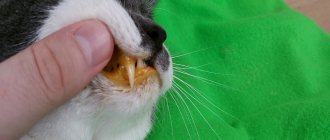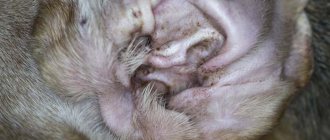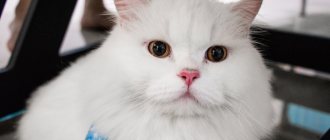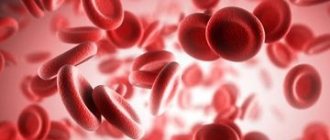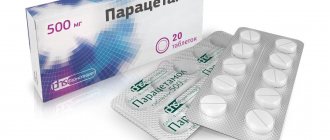AIDS affects not only people, but also their pets. A similar disease is caused by the feline immunodeficiency virus. For a long time, the infection proceeds hidden, so sick pets often infect others. For timely detection of the pathogen, laboratory diagnostics is needed, so it is very important to regularly check your mustachioed pets at the veterinary clinic.
What is VIC
Feline immunodeficiency virus (FIV) is an infectious disease that depletes the immune system. Most often, it affects cats over the age of 5 years, who roam freely on the street or live in crowded conditions.
Description of the virus
The international name for feline immunodeficiency is FIV, or Feline Immunodeficiency Virus. It is caused by a lentivirus, which has a long incubation period. This pathogen is part of the retrovirus family and is a close relative of HIV.
The FIV virus was discovered by Americans when they found it in a Californian nursery. Despite its relationship with HIV, the feline infection has its own differences. The pathological effect of the pathogen occurs on T-lymphocytes, which are responsible for the acquired immune response. With timely treatment, a sick pet can live a long and happy life.
Danger to the animal
Due to the depletion of the immune system, secondary infections occur. Having lost its defenses, the body cannot fight back, so the animal often dies due to concomitant diseases.
An equally dangerous consequence is leukemia, that is, blood cancer. This cancer develops against the background of hematological disorders, accompanied by severe anemia (anemia).
Treatment of the disease
It is impossible to cure feline AIDS; we can only slow down the effect of the virus. Symptomatic therapy consists of two stages:
- support the cat’s immune system, inhibiting the development of the virus;
- carry out treatment of concomitant diseases.
If an animal becomes infected, it is necessary to treat it throughout its entire life, since discontinuation of medications will lead to a sharp exacerbation of symptoms. The main list of medicines used is as follows:
- Broad-spectrum antibiotics. They help fight the consequences of secondary diseases.
- Hormonal drugs (Dexamethasone, Prednisolone). Used in combination with antibiotic therapy;
- Antiretroviral drugs used to treat people with AIDS (Zidovudine). They must be taken under the supervision of a physician. There is positive experience in treating cats with these drugs.
- Recombinant feline interferon. This drug enhances the body's immune response and has a good antiviral effect.
- Immunomodulators (Immunofan, Gamavit) and vitamins B, D, E, C help support immunity.
For infected cats, treatment isn't everything. Owners should know that such an animal requires special care, which must be provided throughout its life. Its main goal is to maintain a high quality of life and minimize the risk of transmitting the virus to other animals:
- mandatory sterilization of the animal;
- maximum isolation - an infected cat should not live with other animals;
- keeping exclusively indoors;
- enhanced nutrition, which will help maintain the animal’s immune system at a high level;
- excluding raw meat, fish and milk from the diet will protect it from possible infections that are transmitted through the gastrointestinal tract;
- mandatory timely deworming and control of skin parasites;
- protection from stressful situations;
- regular preventive examinations to identify additional infections.
Is FIV transmitted to humans?
HIV in humans and FIV in cats are diseases caused by different pathogens from the same family. Because of this feature, neither an animal nor a person can infect each other. However, owners of sick pets should not let their guard down. With secondary infection, they can become infected from their baleen:
- leptospirosis;
- protozoal infections (toxoplasmosis, giardiasis, cryptosporidiosis);
- ringworm;
- helminthiasis;
- rabies and other dangerous pathologies.
Children under 12 years of age whose immune systems are still developing are at risk. For this reason, it is recommended to limit communication with an infected pet.
Prevention
Owners of pets with feline AIDS are required to adhere to the following preventive measures:
- Study of the condition of parental couples for the presence of antibodies to FIV.
- Regular quarantine in catteries.
- Disinfection of places where furry patients are kept and their care items.
- Qualified treatment and prevention of various infections in cats.
FIV cannot be completely cured. The cat remains a virus carrier forever. With feline AIDS, you will also have to fight secondary infections. Harmful microflora is suppressed with antibiotics in combination with corticosteroid hormones.
Ways of infection of cats
Transmission of the virus occurs by contact through the patient’s biological fluids: sperm, blood, saliva. An animal can become infected:
- during mating;
- in utero;
- during blood transfusion (blood transfusion);
- from a bite or scratch through saliva;
- during licking by an infected person (provided there are lesions on the skin or mucous membranes).
Cats living outside are more aggressive than domestic cats. To survive, they have to fight for food and shelter, so they are at risk. The number of infections is also influenced by uncontrolled matings, common among stray animals.
Caring for a sick animal
The purpose of such care is to prevent secondary infections, which are very dangerous for an immunodeficient animal. Therefore, it is important to choose the right food for your pet, preferably dry, since it is less conducive to the deposition of tartar - the source of many infections. At the same time, it is recommended to give vitamin complexes.
Vaccination
Important! You should definitely consult with your veterinarian about what vaccinations you can give your animal.
Knowing information about feline AIDS, such as what it is and how it develops, is important to protect your pet from parasites. After all, their bites can transmit various dangerous diseases.
Main symptoms
Symptoms of immunodeficiency in cats do not appear immediately. In 18% of those infected, the disease is asymptomatic, reminding of its existence only after the development of secondary diseases.
The first alarming symptoms can be detected after the end of the incubation period. These include:
- inflammation of the lymph nodes;
- loss of activity and appetite;
- hyperthermia (temperature rises above 40 °C);
- weight loss;
- diarrhea and severe dehydration.
With subsequent infection with other infections, the symptoms expand. At this point, the patient’s condition attracts the owner’s attention, as the clinical picture becomes more specific.
Stages of the disease
Symptoms of FIV in cats depend on the stage of the disease. The incubation period takes from 1 to 1.5 months. Upon completion, the pathology develops in 3 stages:
- Acute stage
. The appearance of clinical symptoms of acute viral infection. The number of leukocytes in the blood decreases, which can be noticed using laboratory diagnostics.
- Latent period
. Takes about 3 years. Symptoms that appeared earlier disappear even without treatment, which complicates the timely detection of the disease.
- Immunological deficiency
. When secondary pathologies are added, inflammatory processes develop in the lungs and urinary tract, chronic stomatitis, rhinitis and other diseases of the nasopharynx. Skin pathologies characteristic of parasitosis, fungal and bacterial infections may also be observed.
If immunodeficiency is detected at a late stage, the prognosis is disappointing. For this reason, it is important to be examined at a veterinary clinic if even the most minor abnormalities appear. If a cheerful pet with a good appetite falls into apathy and refuses its favorite treats, do not expect self-healing. The sudden disappearance of alarming symptoms is just the calm before the storm.
Pathogenesis and symptoms of FIV in cats
The development of the disease occurs in several stages.
The acute phase begins 3-4 weeks after infection. The virus quickly replicates (multiplies) in lymphoid tissue (lymphocytes and macrophages). Fever, weakness, and lymphadenopathy may occur, but some cats may have no clinical signs.
Then, in most cats, the clinical manifestation of the disease subsides and the animals look healthy. During the latent (hidden) phase, the amount of circulating virus decreases. Ultimately, the virus suppresses the function of B and T lymphocytes, and a decrease in cellular and humoral immunity occurs. This is expressed in a decrease in the number of lymphocytes, neutrophils and an increase in globulins in the animal’s blood. Clinically, this can manifest itself in different ways. In addition, the virus can provoke changes not related to immunity (neuropathy, damage to the respiratory tract and gastrointestinal tract).
Due to decreased immunity, secondary bacterial, viral and fungal diseases and neoplasms (lymphosarcoma, etc.) develop in the body. Chronic bacterial and fungal microflora are activated. Severe infections that accompany immunodeficiency in cats include calicivirus, chlamydia and Microsporum canis.
Presumably, the immunodeficiency of cats itself does not lead to the death of the animal, but only aggravates the course of the underlying disease. Viral immunodeficiency can occur without secondary infections. Clinical signs of FIV may be similar to those of feline leukemia virus.
Due to the fact that the very first signs of the disease are nonspecific and are often mistaken for a slight malaise, clinical signs of the active phase of FIV should be highlighted:
- neurological signs (motor and sensory disorders, sleep disturbances, aggressiveness or apathy);
- indolent skin diseases in cats;
- increased body temperature;
- lymphadenopathy;
- exhaustion;
- anemia;
- diseases of the oral cavity (stomatitis, gingivitis). They begin at a young age and appear throughout the life of the animal until the active phase of the disease;
- chronic respiratory diseases (laryngitis, bronchitis, rhinitis);
- eye diseases (uveitis, glaucoma).
It should be mentioned that with feline viral immunodeficiency in animals older than 7-8 years, the risk of developing lymphosarcoma and, presumably, squamous cell carcinoma increases. Other types of neoplasms are not associated with feline immunodeficiency, but, nevertheless, when they appear, cats should be examined for FIV, because the choice of treatment depends on this.
Visit to the veterinary clinic
The main method of diagnosing FIV is to examine the blood donated for testing. All other checks are individual and depend on the condition of the animal.
Diagnostics and tests
During the initial examination, a sample of biomaterial is taken from a vein from a mustachioed patient. In the laboratory, it is used to carry out the following tests:
- complete blood count (CBC) and blood biochemical test (BAC), demonstrating elevated protein levels and low numbers of neutrophils, red blood cells and lymphocytes;
- serodiagnosis, or enzyme-linked immunosorbent assay (ELISA), which determines the presence of antibodies to the virus;
- polymerase chain reaction (PCR), which detects DNA fragments of an infectious agent.
The disadvantage of serodiagnosis is that during the incubation period, 10% of FIV-infected people may not develop antibodies. It is also possible for antibody levels to drop sharply, preventing their detection. If the ELISA result is negative and there are abnormalities in the CBC and LBC, PCR diagnostics are mandatory.
Possible maintenance therapy
Treatment of immunodeficiency in cats comes down to eliminating associated symptoms and maintaining immunity. A drug that directly combats the pathogen has not yet been developed.
Veterinarians use analogues for humans as antiviral drugs: Zidovudine, Anti-Flu Immunoglobulin and Virbagen Omega. When they are discontinued, the animal experiences a sharp deterioration in its health, so it must be taken for the rest of its life.
Maintenance therapy is based on the use of:
- immunomodulators (Ribotan, LTCI, Anandin), stimulating the immune system;
- antibiotics (Penicillin, Ampiox, Ampicillin) that suppress the effects of pathogenic microorganisms;
- antihistamines (Suprastin, Diphenhydramine) and glucocorticosteroids (Prednisolone, Dexamethasone), which have anti-inflammatory, antiallergic and antitoxic effects;
- drugs that fight hematological disorders (Leucostim, Epocrine).
In case of severe anemia, a blood transfusion is performed to increase the number of lymphocytes and red blood cells. Despite the good result, the effect of this procedure is temporary. There is also a risk of intolerance to foreign blood cells, which can be fatal.
How to treat immunodeficiency virus in adult animals
Cats suffering from FIV infection are treated symptomatically, and it is not yet possible to get rid of the virus itself.
Viral immunodeficiency, unfortunately, cannot be cured, but it is possible to maintain a decent life for an animal.
Svetlana Vladimirovna Spiridonova, veterinarian
https://www.zoovet.ru/forum/?tid=7&tem=985123
Many owners of sick cats, after consulting with a veterinarian, decide to support their pets with antiviral drugs. However, not all experts believe that this helps the animal. The fact is that if you start giving your cat medications to boost immunity and then abruptly stop using them, the animal’s body will malfunction. The virus will increase its negative impact on the body, and the cat will become worse. Therefore, if you decide to support your pet with such drugs, then know that this is forever. The following drugs are usually prescribed as such drugs:
- Anti-influenza immunoglobulin (or anti-measles);
- Zidovudine (in parallel with the use of the medicine, you need to monitor your blood condition - take tests every week);
- Virbagen Omega (Feline interferon-w) is a recombinant interferon for cats.
Photo gallery: antiviral drugs to support the cat’s body
Virbagen Omega was developed specifically for animals, so it does not cause any side effects, but some veterinarians consider this drug to be ineffective
Zidovudine (Retrovir) is developed for humans, so it may cause side effects (vomiting, anemia, etc.) in cats.
Medicines that were created to treat people with HIV infection can be expensive (depending on the manufacturer)
In addition to antiviral drugs, immunomodulators and immunostimulants may be prescribed. Their effectiveness in FIV has not been proven, but there is no data on the harm of these drugs. Medicines that support the affected immune system of a cat can fight some secondary infections. Typically, animals are prescribed one of the following immunostimulants:
- Glycopene (available in tablet form, dosage depends on the weight of the animal);
- Anandin (cannot be used to treat cats with renal failure);
- Fosprenil;
- Roncoleukin;
- Ribotan;
- Polyferrin-A;
- LTCI (T-lymphocyte immunostimulator) is considered one of the most effective drugs for FIV.
Photo gallery: immunomodulators and immunostimulants for FIV
Anandin should be used with extreme caution (many side effects)
Polyferrin is a protein preparation of lactoferrin, not sold in every veterinary pharmacy.
Immunodeficiency is the main indicator for taking Ribotan, but the drug can cause an allergic reaction
Fosprenil is one of the most popular immunomodulators for maintaining the immunity of cats.
Roncoleukin is based on a yeast strain, so the active substance can cause allergies
Glycopene must be used regularly; even one missed dose of the medication can lead to “zeroing” the effectiveness
To suppress pathogenic microflora, the veterinarian may prescribe antibiotics:
- ampicillin;
- Ampiox;
- cephalosparin;
- penicillin, etc.
To make the antibiotic more effective, it is sometimes combined with corticosteroids. But there is a caveat: when choosing such drugs, the veterinarian must ensure that the recommended drug does not reduce immunity. In addition, a cat with immunodeficiency may be prescribed antihistamines:
- Diphenhydramine;
- Suprastin;
- Pipolfen;
- Loratadine;
- Tavegil, etc.
Photo gallery: antihistamines for immunodeficiency
Antihistamines can relieve itching, swelling and allergic reactions
Many antihistamines have a sedative and hypnotic effect
Sedatives can relax smooth muscles and relieve pain
Some antihistamines have an antiemetic effect
The immunodeficiency virus suppresses the activity of the bone marrow, which can cause hematological disorders (neutropenia, lymphopenia, anemia, etc.).
When children ask me what anemia is, I explain, as they say, on my fingers. Blood consists of cells of different colors. When there are few red erythrocytes in the blood, anemia (anemia) develops. And when there are not enough white blood cells in the blood - lymphocytes - this is called lymphopenia. With this disease, the body loses its main immune soldiers, because lymphocytes are needed to fight infections. Neutropenia is one of the conditions associated with lymphopenia.
To combat these conditions, the following drugs are prescribed:
- Neupogen, Leucostim, Filgrastim, etc. (for neutropenia);
- Epocrine, Epoetin Beta, Erythrostim, etc. (for anemia).
Photo gallery: drugs prescribed for hematological disorders
The international name of Neupogen and Leucostim is Filgrastim
Recormon and similar products are well tolerated by cats, so they can be used for a long time
An analogue of Epoetin Beta is the drug Epocrin
To correct hematological conditions, you can choose a domestic or imported drug, the difference will only be in the cost of the drug
Blood transfusions are sometimes indicated in the treatment of anemia. This procedure gives a good result, so you can quickly and effectively achieve an increase in red and white blood cells. However, transfusion is not available in every clinic, and this procedure only gives a temporary effect. Foreign blood cells can cause anaphylaxis (a rare type of intolerance) - this phenomenon can kill the cat.
Usually all treatment comes down to taking vitamins and fighting secondary infections. The fact is that antiviral drugs and bone marrow stimulants are not cheap. For example, the price for 1 ampoule of Neupogen can reach 5 thousand rubles, and a package of Erythropoietin can reach 4 thousand rubles. Some drugs are not sold in Russia at all, so loving and desperate cat breeders order imported drugs, which are even more expensive. In addition, veterinarians rarely prescribe such effective remedies, since feline AIDS is not always diagnosed.
But not everything is as sad as it seems. Compared to people who have HIV infection, cats with FIV can survive. Cases of animal deaths from AIDS are rare. The life of domestic animals is much shorter than that of a human, so infected cats do not have time to feel the full impact of the insidious virus. Even if the diagnosis is made at the age of 10 years, and the owner supports his pet with medications and care, the animal can live for another 5–8 years. And the average life expectancy of cats is 15–16 years. Therefore, there is no need to despair and resort to extreme measures. On the contrary, give your pet more attention and care, and he will thank you with a happy purr.
Do kittens get sick and how to treat them?
Kittens can also get AIDS, but this is rare. Since, most likely, the infection occurred from the mother cat, you can initiate an examination of the baby. If your cat feels unwell, and you suspect she has FIV infection, then she and all the kittens should be taken to the veterinarian.
Kitten owners are worried that their little pets may be infected at an early age
Treatment for kittens is the same as for adult animals. The only difference will be in the dosage of the drugs. Firstly, this is due to the fact that in babies the immune system is not fully formed. If from an early age a cat lives entirely on artificially acquired antibodies, then in the future the animal’s body will not be able to independently resist even mild infections. And secondly, many drugs prescribed for FIV are created for treating people, and this is a completely different concentration of active substances.
In the case of immunodeficiency in kittens, everything depends on the veterinarian. The specialist must not only recognize the infection, but also prescribe competent support for the baby’s body. It may also be that FIV infection in a kitten is in a latent state. In this case, you don’t have to stuff the animal with strong drugs. This will require proper care, because the owner will have to protect his pet from viruses and infections. Some cat breeders, when a virus is detected in kittens, think about euthanizing them, but I believe that this is inhumane.
Forecasts for the future
The prognosis directly depends on the condition of the animal and the course of the disease. If diagnosed at a late stage, a cat can live for about a year. At this point, the body is severely depleted by chronic diseases and is maximally vulnerable to any infections.
Death from FIV is rare. On average, cats with this diagnosis live 5-8 years. Given the average life expectancy, FIV-infected pets are more likely to die from old age rather than from infection.
To ensure a long and happy life for a mustachioed pet, the owner will have to regularly give it all the necessary medications and protect it from other diseases with the help of:
- Castration and sterilization. After the operation, the animals become calmer and less likely to get into fights with their relatives.
- Isolation from other animals. Due to a weakened immune system, another infection on the street can be fatal. This will also prevent further spread of FIV.
- Timely treatment for fleas, ticks and worms.
- Avoiding stress. During exciting events (moving, birth of a child, renovation), use calming medications with pheromones.
- Annual vaccination. Vaccinations are permissible only in latent cases and only in a “killed” form. A vaccine administered during an acute form can lead to severe complications.
- Therapeutic diet. Veterinarians recommend using dry food. They prevent the formation of tartar, which is the cause of many diseases.
- Annual blood donation. Regularly checking the results will help to identify possible deviations in a timely manner and adjust the treatment plan.
Before contacting a sick pet, be sure to wash your hands and do not forget to put away your outdoor shoes immediately after returning home. Check the condition of your cat's skin, fur, and mouth daily. The cat must be weighed once a week to guard against sudden weight loss.
Treatment of feline viral immunodeficiency
Therapy for feline viral immunodeficiency, like HIV therapy, includes symptomatic treatment (acts on clinical signs of the disease), suppression of the activity of secondary microflora and treatment and reduction of the risk of concomitant diseases. In this case, antibiotics, corticosteroids, and, if necessary, special diets and immunomodulators are used.
In some cases, with FIV it is possible to use specific antiviral drugs that are used in human medicine in the treatment of AIDS. But they are quite toxic and, if discontinued, contribute to a greater spread of the virus and the development of a severe clinical situation.
